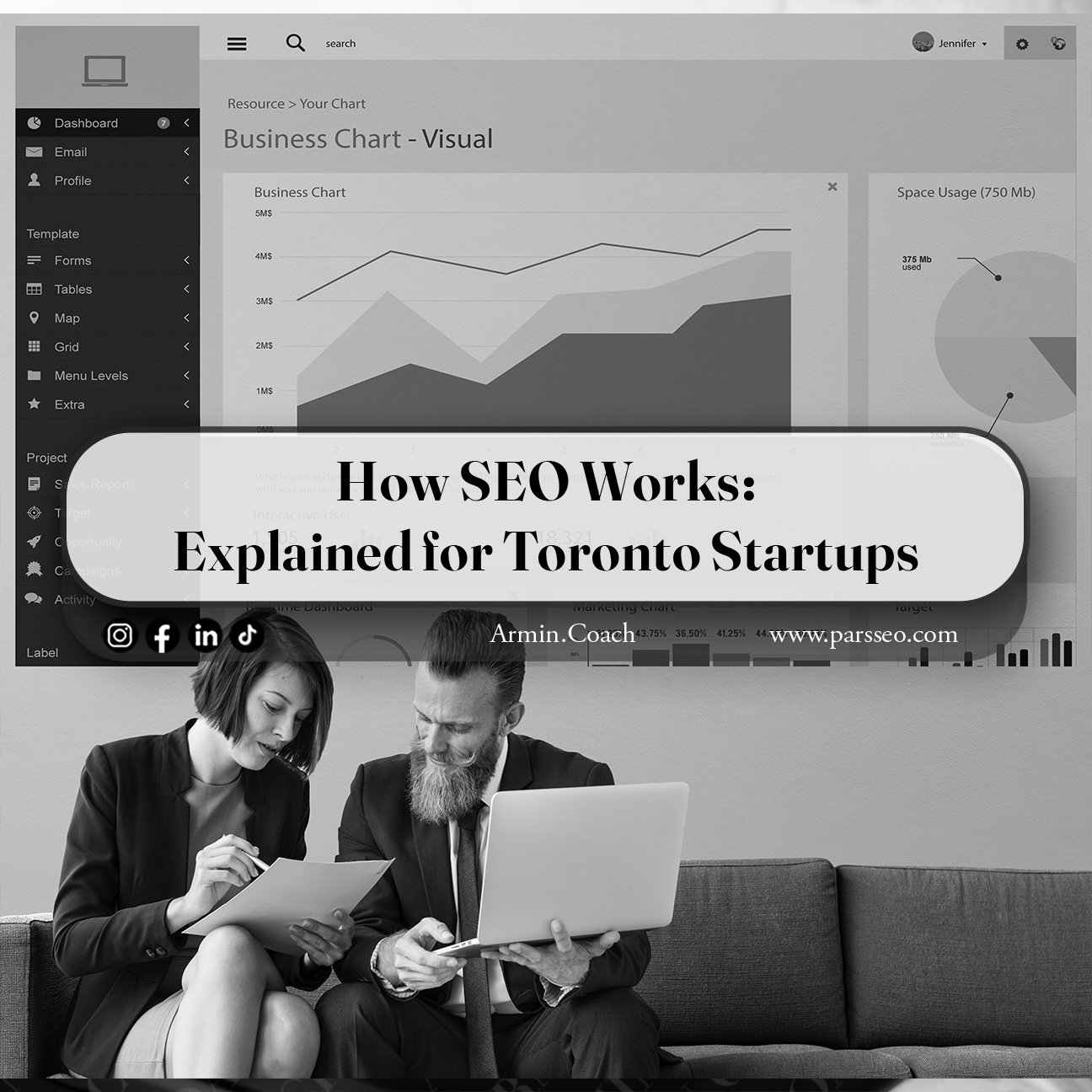Why SEO Is the Lifeline for Toronto Startups
Toronto is home to one of the fastest-growing startup ecosystems in North America. From fintech innovators to health-tech disruptors, new businesses are constantly being launched with bold ideas and ambitious goals. But here’s the reality check: even the most groundbreaking startup will struggle if customers can’t find it online. Visibility is the currency of growth in today’s digital economy, and that’s where SEO comes in.
For Toronto startups, SEO (Search Engine Optimization) isn’t just another marketing buzzword. It’s a long-term growth engine that builds trust, drives organic traffic, and generates sustainable leads without the constant burn of paid ads. Paid advertising may get you quick clicks, but once your budget dries up, so does your visibility. SEO, on the other hand, compounds over time—delivering lasting benefits that can propel a startup from obscurity to authority.
This article will walk you step by step through how SEO works, why it’s especially important for Toronto startups, and practical strategies you can implement today to gain a competitive edge. By the end, you’ll understand not just the “what” of SEO, but the “how” and the “why” that make it an indispensable tool for growth.
Understanding SEO: Beyond Just Rankings
A lot of entrepreneurs mistakenly think SEO is just about ranking #1 on Google. While rankings are important, SEO goes far deeper. At its core, SEO is about connecting your startup with the right audience, at the right time, with the right message.
Here’s a broader view of what SEO really means:
-
Visibility – Making sure your business shows up when potential customers search for solutions you provide.
-
Credibility – People trust websites that appear on the first page of Google more than those buried on page three.
-
Traffic Quality – SEO doesn’t just bring more visitors; it brings the right visitors who are actively looking for what you offer.
-
Cost-Effectiveness – Unlike PPC ads, SEO builds a long-term foundation that keeps bringing results even after the initial investment.
For a Toronto-based startup, imagine this scenario: you’ve launched a new food delivery app that focuses on healthy meals. With SEO, you can target searches like “healthy meal delivery Toronto” or “Toronto organic food delivery.” These aren’t random visitors—they’re people in your city actively searching for exactly what you offer. That’s the power of SEO.
How Search Engines Work: Crawling, Indexing, and Ranking
To understand how SEO works, you need to know how search engines like Google operate. Think of Google as a massive library with billions of books (websites). When someone types a query, Google’s job is to deliver the most relevant “book” in milliseconds.
The process involves three key steps:
-
Crawling
Google uses automated programs called crawlers or spiders to discover content on the internet. These crawlers follow links from one page to another, scanning text, images, videos, and code. -
Indexing
Once a crawler discovers a page, it stores the information in Google’s index (a huge digital library). The index organizes and categorizes pages based on content, keywords, and relevance. -
Ranking
When a user searches for something, Google analyzes the index to find the most relevant results. It considers hundreds of ranking factors—such as content quality, backlinks, page speed, and mobile usability—to decide the order in which websites appear.
For a Toronto startup, your goal is to make sure Google can easily crawl your website, index your pages correctly, and rank them for keywords your audience is searching for. If your site isn’t crawlable, indexable, or optimized, you’re invisible—no matter how great your product is.
On-Page SEO: The Foundation of Visibility for Startups
On-page SEO is everything you can control directly on your website to make it more search-engine-friendly. For startups in Toronto, this is often the first step to gaining traction online.
Keyword Research: Speaking the Language of Your Audience
At the heart of SEO lies keyword research. Keywords are the exact phrases your potential customers are typing into Google. For example:
-
A fintech startup in Toronto might target: “best budgeting app Toronto.”
-
A local wellness brand might target: “organic skincare Toronto.”
-
A B2B SaaS startup might target: “CRM software for small businesses in Toronto.”
Choosing the right keywords is about balancing search volume with competition. Startups should also focus on long-tail keywords—longer, more specific phrases that usually have less competition and higher conversion rates.
Example: Instead of targeting “meal delivery” (too broad), aim for “affordable vegan meal delivery Toronto.”
Title Tags and Meta Descriptions
Your title tag and meta description are the first things users see in search results. They act as your “digital billboard.”
Example for a Toronto startup offering SEO services:
-
Title: “Affordable SEO for Toronto Startups | Boost Your Online Growth.”
-
Meta Description: “Discover how SEO can help Toronto startups attract customers, build credibility, and grow sustainably. Get found where it matters most—Google.”
Well-crafted tags increase click-through rate (CTR), which in turn signals to Google that your page is valuable.
Content Optimization
Google rewards websites that consistently publish high-quality, relevant, and original content. For startups, content is the chance to showcase expertise and build trust.
Examples of content a Toronto startup can create:
-
Blog posts answering common customer questions.
-
Case studies of Toronto clients or users.
-
Ultimate guides related to your industry.
-
Landing pages targeting city-specific keywords.
When writing content, always:
-
Use your primary keyword naturally.
-
Add secondary/related keywords.
-
Organize with headings (H1, H2, H3) for readability.
-
Include visuals (images, videos, infographics).
User Experience and Internal Linking
Google increasingly prioritizes user experience (UX) in rankings. A confusing, cluttered site pushes visitors away, while a smooth UX keeps them engaged.
-
Make your site easy to navigate.
-
Use clear calls-to-action (CTAs).
-
Ensure fast load times.
Internal linking is another vital element. Linking one page to another within your website helps both users and search engines discover content.
Off-Page SEO: Building Authority and Trust
If on-page SEO is about optimizing what’s on your site, off-page SEO is about building credibility outside your website. Google views backlinks and online mentions as votes of confidence.
Backlink Building
Backlinks are links from other websites pointing to yours. They signal trustworthiness and authority. But not all backlinks are created equal—quality matters more than quantity.
For Toronto startups, great backlink opportunities include:
-
Local business directories.
-
Guest posts on Canadian startup blogs.
-
Features in Toronto-based publications (e.g., Toronto Star, BlogTO, BetaKit).
-
Partnerships with other startups or accelerators.
Example: If your tech startup gets mentioned in a TechTO article with a backlink, that single link could be more powerful than dozens of low-quality ones.
Social Signals
While Google has said social shares don’t directly influence rankings, they increase visibility. A blog post shared widely on LinkedIn or Twitter can drive more traffic, earn backlinks, and enhance brand awareness—all indirectly boosting SEO.
Brand Mentions and PR
Even if a site mentions your startup without linking, Google still takes it as a sign of relevance. This is especially useful for startups aiming to build authority fast.
Technical SEO: Behind-the-Scenes Optimization
Website Speed
-
Use Google PageSpeed Insights.
-
Compress images and code.
-
Use a CDN.
Mobile Friendliness
-
Responsive design is non-negotiable.
-
Mobile-first indexing makes this critical.
Structured Data
-
Add schema markup for reviews, products, or FAQs.
HTTPS and Security
-
Secure sites rank higher and build trust.
Local SEO for Toronto Startups
Google Business Profile
Claim and optimize your profile with photos, updates, and reviews.
Local Citations
Ensure consistent NAP across directories.
Reviews
Encourage customers to leave positive feedback on Google.
Content Marketing and SEO: The Perfect Match
Blogging for Authority
Publish consistent posts targeting customer pain points.
Video SEO
Optimize YouTube videos with keywords, transcripts, and descriptions.
Long-Form Guides
Create in-depth guides for higher rankings.
Case Studies
Showcase Toronto-based clients as proof of success.
SEO Tools and Analytics
Startups should leverage tools to measure progress and uncover opportunities:
-
Google Analytics: Track traffic sources and user behavior.
-
Google Search Console: Monitor indexing, keywords, and errors.
-
SEMrush / Ahrefs: Competitive analysis, backlink data, and keyword insights.
-
Moz: Local SEO tools for citations and rankings.
Common SEO Mistakes for Startups
-
Targeting overly broad keywords.
-
Ignoring mobile optimization.
-
Publishing thin, low-quality content.
-
Forgetting technical fixes (broken links, missing alt text).
-
Expecting results overnight.
SEO Timeline: When Do Results Show?
SEO is a long-term investment. For most Toronto startups:
-
3–4 months: Initial improvements (indexing, keyword impressions).
-
6–9 months: Noticeable increases in traffic and rankings.
-
12+ months: Strong authority, consistent lead generation.
Patience and consistency are key.
The Future of SEO: What Startups Must Watch
-
AI and Machine Learning: Smarter algorithms that reward context, not just keywords.
-
Voice Search: Optimizing for conversational queries like “best coworking spaces near me.”
-
Zero-Click Searches: Featured snippets, knowledge panels, and local packs dominating results.
-
User Experience Signals: Engagement metrics will matter even more.
Conclusion: Why SEO Is Non-Negotiable for Toronto Startups
In Toronto’s competitive startup ecosystem, SEO is no longer optional. It’s the growth engine that ensures your brand gets discovered, builds credibility, and generates leads sustainably. Paid ads may give you temporary boosts, but SEO compounds into long-term visibility and authority.
By focusing on on-page, off-page, technical, local SEO, and content marketing, startups can create a powerful presence that attracts the right customers at the right time. Combine this with analytics, patience, and adaptability, and SEO becomes the foundation on which Toronto startups can thrive.
The digital marketplace rewards visibility, and visibility is exactly what SEO delivers. For every Toronto startup looking to stand out in a crowded city of innovators, the path is clear: invest in SEO today, and reap the rewards tomorrow.





